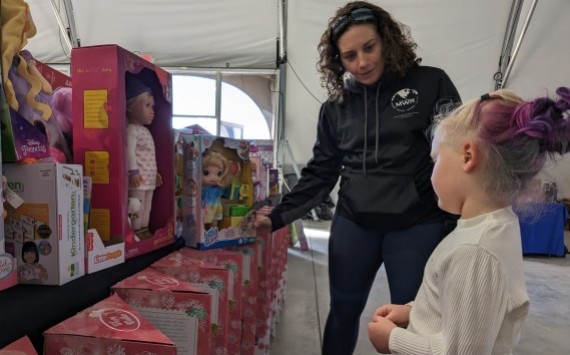Given the traditional 15 to 20 percent pass rate, the Expert Field Medical Badge stands apart as one of the most prestigious and hard won awards an Army medical professional can obtain.
Soldiers know and speak of the badge chiefly by its acronym, EFMB, and it is synonymous with three ‘T’s”: technical ability, tactical proficiency and Soldier tenacity. Among military medical professionals the EFMB is literally a badge of excellence.
The Weed Army Community Hospital hosted and facilitated the qualification of events for 122 Soldiers coming from posts across the United States seeking to earn the badge, Dec. 12 through 18, at the National Training Center. EFMB testing last took place on Fort Irwin in 2001.
Qualification for the badge is considered a grueling experience by those who have earned it. Participants are required to exhibit superior physical fitness and mental toughness while accurately and effectively performing complex life-saving medical tasks in a variety of hostile environments and situations. Consequently, the majority of participants are knocked out as “No-Go’s” by the third day of testing.
The EFMB is considered the medical equivalent of the Expert Infantryman’s Badge, but is said to be far harder to earn.
During the week, participants ran a gauntlet of tests including a formal six-page written test with questions in general military and medical knowledge, preventive medicine, map reading and land navigation trials – in both day and night. Participants endured a battery of test scenarios that included tactical combat casualty care, medical and casualty evacuation tasks as well as leadership/warrior skills tasks.
The week of testing culminated in a 12-mile forced road march, known as a ‘ruck-march,’ that must be completed by candidates within three hours while carrying a standard 35-pound kit of fighting gear.
The scenarios designed for the EFMB testing were purposefully intense to simulate combat conditions Soldiers would most likely experience in the field and the NTC Operations Group observer/coach/trainers worked closely with representatives from WACH to create the jarring sounds and distractions, realistic casualties, surprise pyrotechnics, smoke, and opposing force activity in order to replicate a combat experience tailored and relevant to medical scenarios.
“This is my second try at the badge,” explained Capt. Alyssa Noltner, brigade medical officer with 2nd Brigade Combat Team, 82nd Airborne Division, who had made the trip to Fort Irwin from Fort Bragg, N.C. “Everyone knows Irwin is the most realistic place for desert combat training and their people are good – absolutely unyielding in trying to create a realistic, current training environment. That’s made this better, sure, but the EFMB is tough enough as it is!”
Of the 122 Soldiers who began testing, only 33 emerged to accept the badge from WACH Commander Col. Jason Wieman at the Fort Irwin parade field, Dec. 18.
“If a Soldier is injured, if anybody is injured for that matter – combat scenario or otherwise – they can thank their lucky stars if one of these Soldier medics shows up to take care of them,” Wieman said at the award ceremony. “They have proven that they can stabilize life threatening injuries, protect themselves and their Soldiers, that they can get them evacuated and to the next level of care, quickly and in the most austere conditions. Their testing here at NTC brought a new meaning to that.”
About the Expert Field Medical Badge
United States Army medics who see combat action on the front line, in the midst of battle, have been eligible to earn the Combat Medical Badge since 1945. In June 1965, the Army expanded its awards program by implementing the EFMB for combat medics who do not see battle.
Rigorous testing in the classroom and in performance exercises qualifies the military medic from both the U.S. Army and Air Force, as well as North Atlantic Treaty Organization soldiers to earn the EFMB. While not actual combat duty, the test itself is so difficult that only 16.2 percent of those who tried it passed it in 2015. The EFMB is considered one of the most prestigious Army skill badges of all.
Applicants must have cardiopulmonary resuscitation certification to take the test. They must also have passed the Army Physical Fitness Test and the M16 or M4 weapons qualifications within 12 months of test application.
The EFMB test is the utmost challenge to the professional competence and physical endurance of the Soldier medic. While the Combat Medical Badge is the “portrait of courage” in wartime, the EFMB is undoubtedly the “portrait of excellence” in the Army all of the time.












